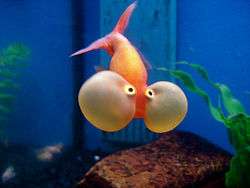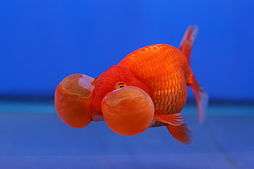Bubble Eye
The Bubble Eye is a small variety of fancy goldfish with upward-pointing eyes that are accompanied by two large fluid-filled sacs. It is a dorsal-less fish – good specimens will have a clean back and eye bubbles that match in color and size. Their bubbles are quite delicate, so the fish should be kept separately from boisterous types, as well as sharp tank decor. Although the bubbles will regrow if punctured, an injury could leave the fish prone to infections. The bubbles can disadvantage the fish as it is not a strong swimmer, with a seemingly low bobbing head at times; bubbles are infamous for being sucked into filters and siphons in an aquarium.[1][2]
| Bubble Eye Goldfish |
|---|
 |
| Country of origin |
| China |
| Type |
| Bubble eye |
| Breed standards |
| BAS |
Description
.jpg)
The Bubble Eye normally has an evenly curved back that lacks a dorsal fin. The pair of large pouches of skin attached under its eyes jiggle as it swims.[1] Bubble Eyes have metallic scales, and they are similar to the celestial eye goldfish.[3] The eyes of the Bubble Eye goldfish are normal in the young fry but will start to develop eye bladders three months after hatching.[3] Like ranchu, the bubble eye goldfish lacks a dorsal fin and has a double tail.[4] They normally grow up to 3 to 4 inches in length. If one of their "Bubbles" pop due to pressure or collision with a sharp object, there is a risk of infection where the inside of the sac has been exposed.[5]
Variants
The precursor to the Bubble Eye, known as the Toadhead or hama-tou, had upturned eyes and very small, bladder-like sacs.[6][7] Through selective breeding, the bubble eye is currently available with either a long or more rounded body and the choice between matte, metallic or nacreous scales.[8] A recent development of the bubble eye has four eye sacs rather than the usual two.[9] Desirable colors for these fish include red, calico, orange, red and white, and the rare black.[10]
Care
Due to the delicate eye sacs, enthusiasts must ensure that their bubble eye is kept in aquariums free from sharp objects. However, due to the fish's visual impairment, it is recommended that they are kept with other bubble eyes, black moors, demekins and celestial goldfish to ensure fair competition for food.[11]
Medical uses
Researchers in Japan have theorized that the liquid in the bubble eye's sacs could be a stimulant to cell growth.[12] Due to the eye sac's ability to quickly regenerate and refill itself, scientists can milk the same fish every few months with a syringe.[13][14]
See also
References

- "Fancy Goldfish: A Complete Guide to Care and Collecting" by Dr. Erik L. Johnson, D.V.M. and Richard E. Hess, Weatherhill, Shambala Publications, Inc., 2006 - ISBN 0-8348-0448-4
- "Nutrafin Aquatic News: Goldfishes, Issue #4, 2004, Rolf C. Hagen (U.S.A,) Inc. and Rolf C. Hagen Corp.(Montreal, Canada)". Archived from the original on 2011-11-21. Retrieved 2007-05-26.
- "An Interpret Guide to Fancy Goldfish" by Dr. Chris Andrews, Interpret Publishing, 2002. - ISBN 1-902389-64-6
- "The Goldfish Guide" by Yoshichi Matsui and Herbert Axelrod, 1991.
- Free Information Keeping Bubble Eye Goldfish
- "Goldfish variants". Archived from the original on 2017-10-07. Retrieved 2017-10-06.
- Smartt, Joseph (2008-04-15). Goldfish Varieties and Genetics: Handbook for Breeders. John Wiley & Sons. ISBN 9780470999783.
- "Solid goldfish". Archived from the original on 2017-10-07. Retrieved 2017-10-06.
- See photo number 6
- Pure Goldfish types
- "Goldfish", by Paul Paradise. 1979.
- Sawatari (2009). "Cell growth promoting activity from the eyes of the bubble eye". Zoological Science. 26 (4): 254–8. doi:10.2108/zsj.26.254. PMID 19798918.
- "Japanese goldfish experts explore use of bubble eye in medicine". Japan Times. Retrieved 1 September 2018.
- Sawatari (2009). "Cell growth promoting activity from the eyes of the bubble eye". Zoological Science. 26 (4): 254–8. doi:10.2108/zsj.26.254. PMID 19798918.
External links
- Bristol Aquarist's Society - Describes the appearance of the standard, show-quality Bubble Eye
- Goldfish, Part 2 - An excellent article on keeping Bubble Eyes, as well as fancy goldfish in general
- Happy bubble fish video! - A video showing some Bubble Eye fish in action.
- Varieties of Goldfish - About Bubble Eye